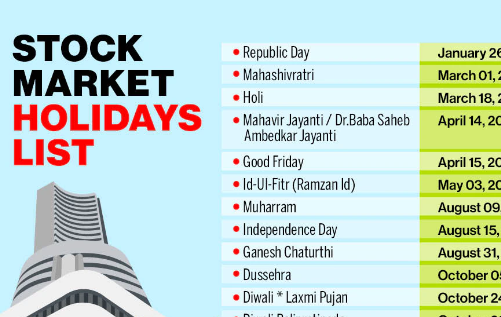Understanding Stock Market Holidays: A Comprehensive Guide
Understanding Stock Market Holidays: A Comprehensive Guide
Related Articles: Understanding Stock Market Holidays: A Comprehensive Guide
Introduction
In this auspicious occasion, we are delighted to delve into the intriguing topic related to Understanding Stock Market Holidays: A Comprehensive Guide. Let’s weave interesting information and offer fresh perspectives to the readers.
Table of Content
Understanding Stock Market Holidays: A Comprehensive Guide

The stock market, a complex and dynamic system, operates on a schedule that is influenced by various factors, including holidays. While most trading days are predictable, certain days are designated as holidays, leading to market closures. These closures are crucial for ensuring the smooth functioning of the market and the well-being of its participants.
The Importance of Stock Market Holidays
Stock market holidays serve several important purposes:
- Employee Rest and Recreation: Like any other industry, employees in the financial sector require time off to rest, recharge, and spend time with their families. Holidays provide this essential break, ensuring their well-being and fostering a healthy work-life balance.
- Market Data Accuracy: During holidays, trading activity ceases, allowing for a comprehensive review and consolidation of market data. This ensures accurate and reliable information is available for analysis and decision-making when trading resumes.
- Regulatory Oversight: Market closures provide regulatory bodies with an opportunity to conduct thorough oversight and ensure compliance with market regulations. This helps maintain the integrity and fairness of the trading environment.
- Reduced Volatility: With no trading activity, market volatility is significantly reduced, allowing for a period of stability and a more predictable market environment upon reopening.
- International Alignment: Some stock market holidays are aligned with national holidays, reflecting the global interconnectedness of financial markets and facilitating seamless coordination.
Navigating Stock Market Holidays
Understanding the schedule of stock market holidays is crucial for investors and traders. Here’s a guide to navigating these closures:
- Calendar Awareness: Familiarize yourself with the official stock market holiday calendar, which is typically published by the relevant exchange or regulatory authority.
- Pre-Holiday Planning: Plan your trades and investment strategies well in advance of holidays to avoid potential disruptions.
- Stay Informed: Stay updated on any changes or announcements regarding holiday schedules, as these can occur due to unforeseen circumstances.
- Consider Alternative Markets: If you need to trade during a holiday, consider exploring alternative markets that may be open.
- Manage Expectations: Understand that market closures can impact your trading strategies and be prepared for potential volatility upon reopening.
FAQs on Stock Market Holidays
1. Why are stock markets closed on specific holidays?
Stock markets are closed on specific holidays to allow employees to rest, ensure data accuracy, facilitate regulatory oversight, reduce market volatility, and align with international schedules.
2. What happens to my investments during a market holiday?
Your investments remain unaffected during a market holiday. However, you cannot buy or sell securities during this period.
3. How can I access market data during a holiday?
While live trading is unavailable, historical data and other relevant information are still accessible through various financial platforms.
4. Are there any exceptions to stock market holidays?
Some markets may have exceptions to holiday closures, particularly for specific types of securities or trading activities.
5. How can I stay informed about holiday closures?
The official website of the relevant stock exchange or regulatory authority provides the most up-to-date information on holiday closures.
Tips for Investors and Traders during Stock Market Holidays
- Review Your Portfolio: Use the time off to assess your investments and make any necessary adjustments.
- Research Market Trends: Utilize the break to analyze market trends and prepare for the next trading period.
- Stay Updated on News: Keep abreast of any significant economic or geopolitical events that may impact the market.
- Consider Long-Term Investments: Holidays are a good time to focus on long-term investment strategies and make informed decisions.
Conclusion
Stock market holidays play a vital role in ensuring the smooth and efficient operation of the financial system. By understanding the reasons behind these closures and navigating them effectively, investors and traders can make informed decisions and manage their investments effectively. Staying informed and adapting to these periodic market closures is essential for maximizing investment opportunities and navigating the complexities of the financial world.








Closure
Thus, we hope this article has provided valuable insights into Understanding Stock Market Holidays: A Comprehensive Guide. We appreciate your attention to our article. See you in our next article!